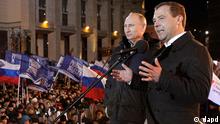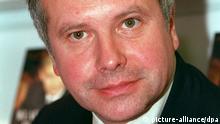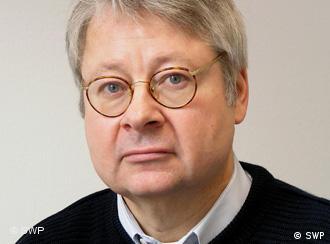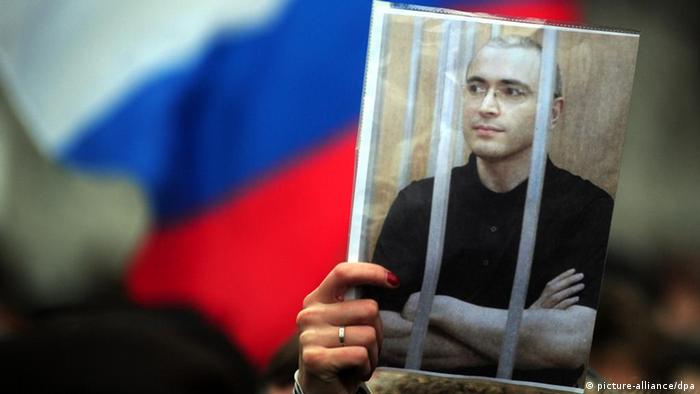Russian authorities are considering whether to release the former oil oligarch and Kremlin critic, Mikhail Khodorkovsky. Outgoing president, Dmitry Medvedev, has set an April 1 deadline.
Calls for former Russian oil tycoon Mikhail Khodorkovsky to be released from jail have been growing since December 2011 when the first public protests were staged in the Russian capital Moscow and elsewhere. Now, after at least one other failed bid for parole, Russia's attorney-general will decide by Sunday whether to permit Khodorkovsky's early release.
Khodorkovsky - the former head of Russian oil giant Yukos - is among 32 other people whose cases are under review.
Earlier this month, Mikhail Fedotov, the director of Russia's presidential council on human rights, contacted Dmitry Medvedev. "I've yet to hear back," Fedotov told DW, but he says he hopes news will come from the outgoing president soon.

Reforms are a political tug-of-war between Medvedev and Putin
In his letter, Fedotov listed analysis from respected legal experts, who believed Russian law allowed for convicts to be pardoned even without their requesting it. In other words, Medvedev could decide himself whether to pardon Khodorkovsky, and his former colleague Platon Lebedev, without their requesting a pardon and thereby being forced to admit guilt.
As the head of Yukos, Khodorkovsky was one of Russia's most influential business people - that is, until he declared a political offensive against then-president, Vladimir Putin. Putin has been prime minister since 2008, but was elected to return as president in elections earlier this month.
Khodorkovsky faced two trials. He was convicted for money laundering and fraud, and was sentenced to eight, and then, 14 years in prison. Last May, the second sentence was reduced to 13 years, giving Khodorkovsky the prospect of parole by 2016.
Medvedev's request to have the Khodorkovsky case reviewed is an indication that the former oil man could be out sooner than 2016. An international group of experts had earlier accused Russian authorities of irregularities during the trials, and a corresponding report from the Russian human rights council was delivered to Medvedev last December. Medvedev could pardon Khodorkovsky or order a re-trial.
Striking a liberal chord
But opinion is divided over whether Khodorkovsky's chances of an early release are genuine.
Sergei Sokolov, publisher of the opposition Moscow daily newspaper, Novaya Gazeta, is skeptical. He says the decision to review the case is a direct response to the protests that led up to this month's presidential elections. It's no coincidence, says Sokolov, that the decision was announced the day after the ballot on March 4. He believes the idea was simply to stop the demonstrations. Khodorkovsky's conviction "will not be overturned." In any case, says Sokolov, the incoming President Putin will have the last word.

Protesters have put pressure on the Kremlin, says German expert
A German Russia expert, however, is more optimistic. "I believe this will be resolved in Khodorkovsky's favor," says Alexander Rahr, director of the Berthold Beitz Center at the German Council on Foreign Relations (DGAP).
Rahr says the protests of the last few months will have pressured Putin to introduce some liberal reforms and to release political prisoners, such as Khodorkovsky. But he also says it's significant that the first move was made by the outgoing president.
"It seems to me that Medvedev has tried desperately in the past few weeks to give his term as president a liberal stroke," says Rahr.
Hans-Henning Schröder at the German Institute for International and Security Affairs (SWP) agrees that Medvedev has been trying to "win over liberal voters" before May, when once again he swaps places with Putin and becomes prime minister.
"But if nothing comes of it, it'll weaken Medvedev," warns Schröder.
Exil as an alternative

Medvedev has been trying to give himself a 'liberal stroke'
Releasing Khodorkovsky may not be in the Kremlin's best interest. The former oil billionaire could strengthen the opposition movement.
"Some members of the opposition and regime critics consider Khodorkovsky a martyr," says the DGAP's Alexander Rahr.
But Rahr says it's possible that Khodorkovsky will be released and then pressured into foreign exile - as was the case with dissidents, such as Aleksandr Solzhenitsyn, during the Soviet era.
Khodorkovsky's release would be supported by the public. Just before the recent presidential elections, the polling firm, the Levada Center, found that about 48 percent of Russians said they wanted political prisoners to be released. According to the poll, only 18 percent were opposed.
Khodorkovsky has so far not commented on news of his possible early release. But a lawyer for the former Yukos boss has said he "laughed" about Medvedev's plans.
Author: Roman Goncharenko / za
Editor: Gregg Benzow
Editor: Gregg Benzow

Comments